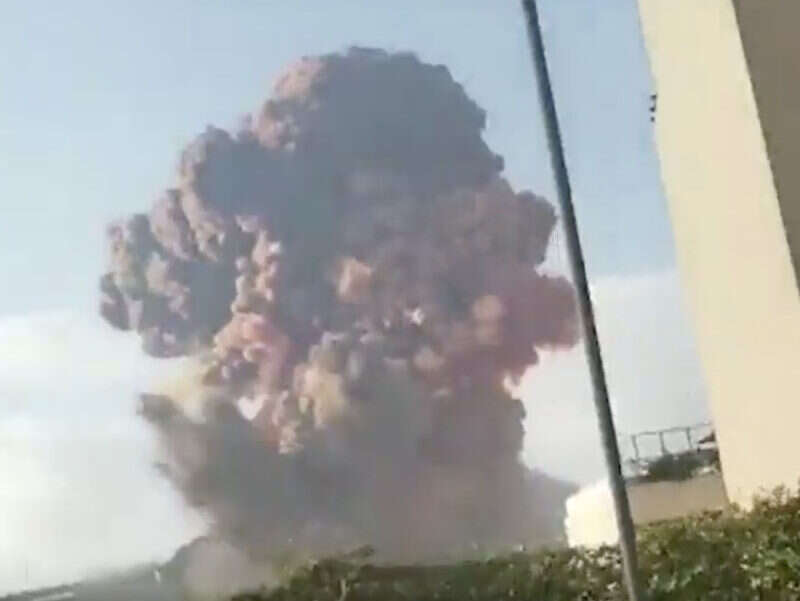
Journalists were among those impacted by the sudden massive explosion that levelled parts of Beirut yesterday evening, killing more than 100 people so far and injuring thousands more.
The Lebanese capital is popular with foreign correspondents and news agencies who use it as a base from which to cover the Middle East.
So far there have only been injuries reported among the press. A number of them took to social media to share their experience.
In one video shared on Twitter, a BBC Arabic reporter can be seen in the middle of a video interview when the shockwave from the blast hits her newsroom. She is seen later taking cover under her desk.
Unbelievable video: a BBC Arabic reporter in Beirut was doing a video interview with a subject in Morocco when the explosion happened https://t.co/g9w0Oo3Zrx
— Tom Gara (@tomgara) August 5, 2020
Bel Trew, Middle East correspondent for the Independent, shared pictures of her flat in the city showing doors and windows blown out.
Morning from #Beirut. Like so many, I’m waking up from a 2 hour nap on my sofa with gaping holes in my walls, wondering where I am going to live. So many dead, injured, missing, so much destroyed. How can the country possibly fix this and get back on its feet? pic.twitter.com/YNHVJEqsLn
— Bel Trew (@Beltrew) August 5, 2020
Trew said she was a few kilometres outside of Beirut when the blast happened at 6pm local time yesterday, but was still thrown to her feet by the shockwave that could be seen in videos on social media.
“It was truly a sight that I have never seen or felt in my decade long career covering conflicts, war and bombings,” the ex-Times reporter told GMB.
Leila Molana-allen, Middle East correspondent for France 24, tweeted last night that she had a “fairly serious foot injury” as a result of the blast.
She later said she had found a first aider to “patch me up” until she could get stitches at a hospital “when they have more capacity for non life-threatening injuries”.
Thank you so much to everyone. A first aider was able to get to me and patch me up enough until I can get stitches at a hospital when they have more capacity for non life-threatening injuries. Very grateful to everyone who reached out. https://t.co/wXKhEzR2rJ
— Leila Molana-Allen (@Leila_MA) August 4, 2020
Another journalist said they were “wounded but stable”.
Checking in. Wounded but stable. To all the eds asking if I can work, answer is no
— Finbar Anderson (@andfinbar) August 4, 2020
Like every other country, Lebanon has been dealing with the coronavirus pandemic, which has left some offices empty.
Dalal Mawad, a senior producer with the Associated Press shared a picture of the news agency’s office in Beirut, showing glass and windows strewn on the floor. “The coronavirus saved us”, she said.
The coronavirus saved us. This is our AP office this morning #Beirut_Explosion pic.twitter.com/0RFtWt6gy5
— Dalal Mawadدلال معوض (@dalalmawad) August 5, 2020
The Lebanese Daily Star, which covers the Middle East, has its main newsroom in Beirut. One staff member shared the devastation wrought by the explosion in a video showing windows and doors blown out, debris on the floor and parts of the ceiling having fallen down.
BREAKING: Massive explosion in Beirut. Footage from the daily star office now in Lebanon pic.twitter.com/2uBsKP5wCH
— Ghada Alsharif | غادة الشريف (@GhadaaSharif) August 4, 2020
The rescue effort is ongoing in the city, with the death toll expected to rise.
Picture: Karim Sokhn/PA Wire
Email pged@pressgazette.co.uk to point out mistakes, provide story tips or send in a letter for publication on our "Letters Page" blog






